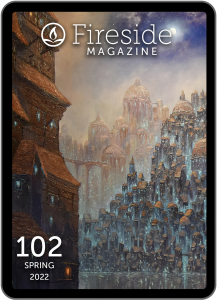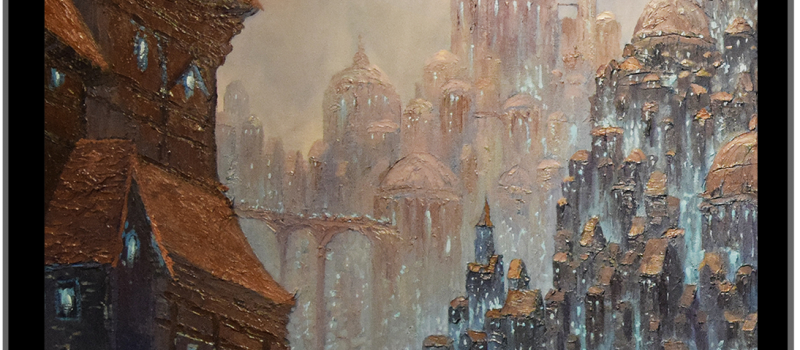Charles Payseur Reviews Short Fiction: Hexagon, Fireside, and Beneath Ceaseless Skies
 Hexagon 3/22
Hexagon 3/22
Fireside 3/22
Beneath Ceaseless Skies 3/10/22, 3/24/22
Hexagon Magazine opens its 2022 releases with its eighth issue, featuring five original stories. While the publication does publish stories in English and French (a trend I’ve been happy to note here and in publications like Omenana as well), all the works in this issue are English originals. All the works are also what I’d classify as fantasy, with some interesting explorations of magic and the borders between the mundane and fantastic, and the dangers lurking at that border. Carol Scheina’s ‘‘In the Book Grove’’ imagines books as grown from the ground rather than written. A negative review can still sink a project, though, as the narrator of the story finds when tasked with destroying an entire crop that isn’t expected to meet with a warm critical reception. Even unpopular stories, though, can contain a kernel of something powerful and vital, and the narrator is placed in a position to either save that, or let it die.
In ‘‘Subaqueous Faeryland’’, Avra Margariti provides a sinking and sharp look at a rarely explored border between the human world and the faery – the one that exists underwater. Getting lost proves no less dangerous beneath the water’s surface, where strange and impossible voices can still lure the unwary to unhappy ends. ‘‘Two Condition Reports from the Museum of Mythologic Science and Paranatural History’’ turns the mood of the issue in a more lighthearted direction, and author Gabrielle Bleu creates a narrative through administrative documents, playing with form while maintaining a coherent and fun tone and plot. Anna Martino introduces a war hero who has just lost his mother in ‘‘Jackadee’’. With her death, though, the truth about what she’s done, and how the hero found success and glory, comes to light. And he has to decide how to face these revelations, and what path he wants to walk going forward – continuing a beneficial lie or doing the hard work of untangling the knots of lies and violence that have dominated his life. It’s a complex look at loss and violation, but carefully accomplished by Martino.
March brought some sad news from Fireside Magazine – the publication is no longer accepting new stories and will be winding down its operations. There are still months worth of content to release, though, and the March issue starts strong and grim with Lindsay King Miller’s ‘‘Since He Came Back’’. An intense take on reanimation, the story finds an otherwise nuclear family where the father died and was brought back by the mother. It’s a change that, to the children who are the viewpoint of the story, isn’t sinister by itself. The father isn’t violent or dangerous, but he is different. It’s in what that difference inspires in the mother, in the guilt and need that she has, where the true danger lurks. M. Darusha Wehm carries forward the emotional weight of the issue with their ‘‘The Stars Above Eos’’, which reveals two beings in a very long-term relationship. They face immortality in two fundamentally different ways, and yet for all that they don’t fully understand each other, while they don’t need to in order to fully love each other. The speculative elements give an epic sweep to their love story, and more than a few emotionally wrenching moments, but through it all there’s hope and beauty and a wonderful warmth. Riley Neither makes zer professional debut with ‘‘Give My Body to the Moths’’, where ze builds a world of danger and fascism, featuring a narrator caught in the middle of complicity and resistance. Faced with giving information on their friends, contacts, and lovers, or being taken and tortured by their government, the narrator is haunted by their actions but still desperate to survive. That is until the return of one of the missing spurs new thoughts and hopes – that resistance and survival, accomplished once, can spread and grow. The issue also includes a poem by Jessica Cho, ‘‘A Message from Her Feline Self, Unborn, to Her Cousin, Whose Ancestors Were Once Wolves’’. Cho deftly creates a tense danger, captured by the lively and reaching voice of the narrator. She feels a need to run, to hunt, to kill or be killed. But beneath that there is also a dream of something different, of something free, where strength can mean something different and more than people think of it now.
The two March issues of Beneath Ceaseless Skies are as well-paired as ever, with the first dealing with artifacts of power and buried histories, and the way past tragedies bleed into the present. Peter Darbyshire returns to his Azrael stories with ‘‘The Angel Azrael Encounters the Revelation Pilgrims and Other Curiosities’’. It’s a grim piece, mixing intense action and death with subtle and profound world building. Though it shares a world with other stories, it can be read and enjoyed completely on its own, capturing a weird Western feel where a ruined world can still be broken further by the beliefs of the past, and especially from those operating in the present in bad faith. The second issue finds a bit more play and joy, though tinged with loss and danger, by focusing on young people journeying into the woods in search of adventure. Kathleen Jennings captures that in ‘‘Merry in Time’’, a kind of twisted fairy tale where a young lordling falls in love with a woman he finds making thread out of nettles in the forest. In order to be together, though, the two must untangle the promises they make to each other, and they have to learn both the difficulties and the transforming effort involved in true love. ‘‘Venturing’’ meanwhile, by Jonathan Louis Duckworth, introduces Zilda, a young girl who loves nothing more than retrieving new stories from the Wilderthere that surrounds her small village. When one venture takes her much farther from home than she intended to go, though, she learns a bit about the price of the hunger driving her away from the safeties of the familiar. Both stories measure out hope and failure, showing that adventures entered into in ignorance tend to extract a high cost, even if they do eventually lead the adventurer to where they most want to go.
This review and more like it in the May 2022 issue of Locus.
 While you are here, please take a moment to support Locus with a one-time or recurring donation. We rely on reader donations to keep the magazine and site going, and would like to keep the site paywall free, but WE NEED YOUR FINANCIAL SUPPORT to continue quality coverage of the science fiction and fantasy field.
While you are here, please take a moment to support Locus with a one-time or recurring donation. We rely on reader donations to keep the magazine and site going, and would like to keep the site paywall free, but WE NEED YOUR FINANCIAL SUPPORT to continue quality coverage of the science fiction and fantasy field.
©Locus Magazine. Copyrighted material may not be republished without permission of LSFF.








